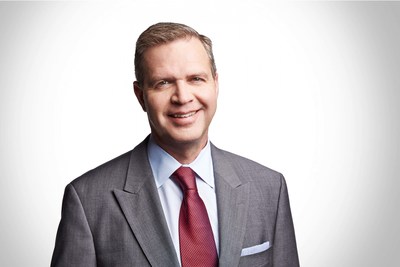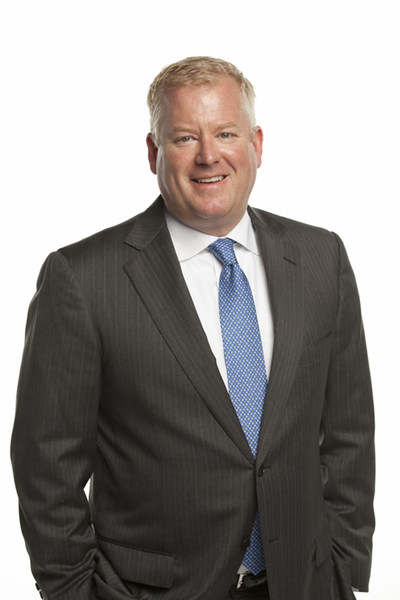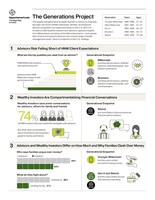OppenheimerFunds Announces New Multi-Generational High-Net-Worth Research Report: "The Generations Project"
Research reveals disconnects and opportunities across a broad range of critical wealth management issues
NEW YORK, June 12, 2018 /PRNewswire/ -- OppenheimerFunds, a leading global asset manager, today announced the release of a new study titled "The Generations Project," which examines the ways in which multi-generational high-net-worth (HNW) individuals think about investing and their relationships with wealth advisors.



Art Steinmetz, CEO of OppenheimerFunds, said, "For nearly six decades, we have been listening to and learning from our clients. Our research continues to uncover new insights that we are using and sharing with advisors to help strengthen their practices and better meet their clients' goals."
Building on the success of the firm's previous research into the investment behaviors and attitudes of wealthy Millennials, the new study is broader in scope and includes the opinions of nearly 2,000 HNW investors and advisors in the U.S. and U.K., encompassing both younger and older Millennials, Generation X, Baby Boomers and the Silent Generation.
"We were surprised to learn that many high-net-worth investors are not prioritizing education around key financial concepts such as budgeting, spending and charitable giving to the next generation," said Ned Dane, Head of Private Client Group, OppenheimerFunds. "As fiduciaries, advisors have an important opportunity to step in and help fill this education gap."
Key Findings for Investors
The study showed that while a vast majority – 84% – of HNW investors believe they benefitted from learning the importance of saving while growing up, not all are planning to pass that knowledge down, with only 48% planning to provide their children with a similar financial education.
The research also found that U.S. investors' home market investing bias, while still prevalent across generations, may be lessening with younger HNW investors. While just 38% of Boomers said they own international stocks, 50% of younger Millennials reported holding international investments.
Additionally, younger HNW Millennials are more likely than other generations to incorporate environmental, social and governance (ESG) standards into their investment decisions, with 37% reporting they own sustainable investments, compared to only 21% of the Silent Generation.
At the same time, nearly two-thirds of respondents with sustainable investments (32%) reported being unsure of their portfolio's total ESG exposure, with that percentage increasing with age. This suggests that more education is required around what investments qualify as sustainable, and about the role that these investments can play in investors' portfolios.
Key Findings for Advisors
The study found that advisors' focus on the needs of certain generations over others has led to a significant disconnect between advisor and investor expectations. For example, 41% of advisors responded that transparency was the most important advisor quality in the minds of younger HNW investors. However, only 23% of HNW Millennial investors agreed, with performance being their top consideration.
Advisors were also found to be a key, but underutilized, source of information and conflict resolution for HNW families:
- Although only 64% of HNW investors said their families argue over money, a much higher percentage of advisors, 94%, reported otherwise.
- While 58% of advisors cited inheritance and estate planning as flash points for their clients, only 12% of investors agreed.
- While 48% of advisors said clients have conflicts over discretionary spending, only 20% of clients reported seeing it that way.
"Our findings indicate that advisors have a clear opportunity to bridge gaps across generations with a more personalized approach, for example, that takes into account the nuances that distinguish younger and older millennials," said Dane. "As rising generations of investors seek guidance on how to acquire, protect and distribute their growing wealth, demands on advisors will continue to increase, as will the opportunities for those who meet these challenges head-on."
This is the third annual high-net-worth study conducted by OppenheimerFunds, which commissioned CoreData Research to survey wealthy U.S. and U.K. investors and advisors who primarily serve high-net-worth clients to better understand investment behaviors and attitudes across all generations, the role of family dynamics and how advisors engage investors. (The U.K. study will be published separately.) Conducted online from December 2017 through January 2018, the study included nearly 2,000 investors and advisors. The minimum net investable assets for investors to qualify for the study was $500,000 (£250,000) for Millennials and $1 million (£500,000) for all other investors. Advisor qualifications included $100 million in assets under management in the U.S and £25 million for the U.K. study.
About OppenheimerFunds
OppenheimerFunds, Inc., a leader in global asset management, is dedicated to providing solutions for its partners and end investors. OppenheimerFunds, including its subsidiaries, manages more than $250 billion in assets for over 13 million shareholder accounts, including sub-accounts, as of May 31, 2018.
Founded in 1959, OppenheimerFunds is an asset manager with a history of providing innovative strategies to its investors. The firm's 16 investment management teams specialize in equity, fixed income, alternative, multi-asset, and factor and revenue-weighted ETF strategies, including ESG, as a signatory of the UN PRI. OppenheimerFunds and its subsidiaries offer a broad array of products and services to clients, who range from pensions and endowments to financial advisors and individual investors. OppenheimerFunds and certain of its subsidiaries provide advisory services to the Oppenheimer family of funds, and OFI Global Asset Management offers solutions to institutions. The firm is also active through its Philanthropy & Community initiative: 10,000 Kids by 2020, reaching children with introductions to math literacy programs.
Web: oppenheimerfunds.com
Tweets: twitter.com/OppFunds
Podcasts: oppenheimerfunds.com/advisors/podcasts
Mutual funds and exchange traded funds are subject to market risk and volatility. Shares may gain or lose value. Alternative weighting approaches (i.e., using factor weighting as a measure), while designed to enhance potential returns, may not produce the desired results.
Shares of Oppenheimer funds are not deposits or obligations of any bank, are not guaranteed by any bank, are not insured by the FDIC or any other agency, and involve investment risks, including the possible loss of the principal amount invested.
Before investing in any of the Oppenheimer funds, investors should carefully consider a fund's investment objectives, risks, charges and expenses. Fund prospectuses and summary prospectuses contain this and other information about the funds, and may be obtained by asking your financial advisor, visiting oppenheimerfunds.com or calling 1.800.CALL OPP (225.5677). Read prospectuses and summary prospectuses carefully before investing.
Oppenheimer funds are distributed by OppenheimerFunds Distributor, Inc.
225 Liberty Street, New York, NY 10281-1008
© 2018 OppenheimerFunds Distributor, Inc. All rights reserved.
SOURCE OppenheimerFunds
Related Links
WANT YOUR COMPANY'S NEWS FEATURED ON PRNEWSWIRE.COM?
Newsrooms &
Influencers
Digital Media
Outlets
Journalists
Opted In
Share this article